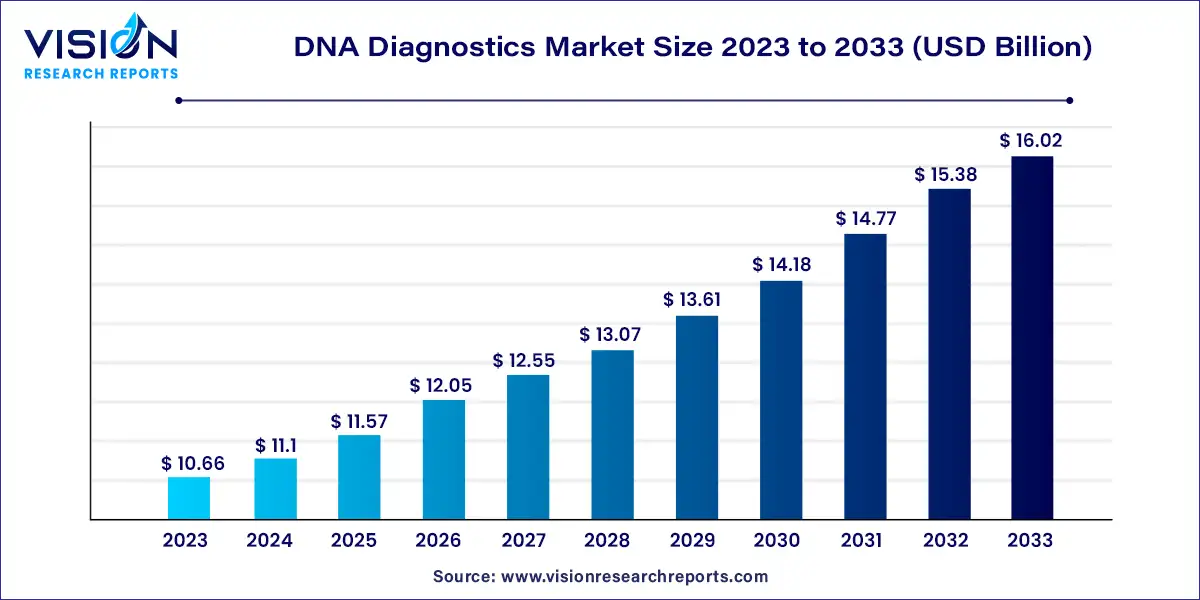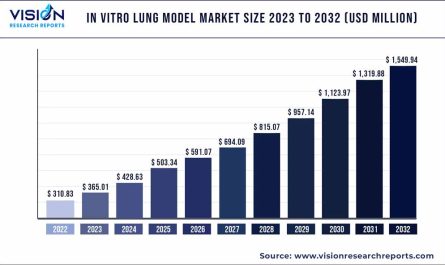The global DNA diagnostics market size was estimated at around USD 10.66 billion in 2023 and it is projected to hit around USD 16.02 billion by 2033, growing at a CAGR of 4.16% from 2024 to 2033.

DNA diagnostics, leveraging the power of genetic information, has emerged as a cornerstone of modern healthcare. By analyzing an individual’s genetic makeup, these diagnostic tools provide invaluable insights into predispositions to diseases, hereditary conditions, and optimal treatment approaches.
Key Pointers
- North America dominated the DNA diagnostics market in 2023 with a revenue share of 44%.
- Asia Pacific is expected to witness the fastest CAGR of 6.29% from 2024 to 2033.
- In terms of technology, the PCR-based diagnostics segment held the largest revenue share of 52% in 2023.
- Next-generation sequencing (NGS)-based diagnosis is anticipated to witness the fastest CAGR of 7.99% over the forecast period.
- Based on application, cancer genetics tests dominated the market in 2023 with a revenue share of 31% in 2023.
- Infectious diseases DNA testing is anticipated to grow at the fastest CAGR of 4.55% over the forecast period.
The Rise of Precision Medicine
One of the key driving forces behind the growth of the DNA diagnostics market is the advent of precision medicine. Unlike traditional one-size-fits-all approaches, precision medicine tailors treatment strategies based on an individual’s unique genetic profile, maximizing efficacy and minimizing adverse effects.
Get a Sample@ https://www.visionresearchreports.com/report/sample/40777
Advancements in Next-Generation Sequencing (NGS)
Next-generation sequencing (NGS) technologies have revolutionized DNA diagnostics, enabling rapid and cost-effective analysis of entire genomes. These advancements have democratized genetic testing, making it more accessible to healthcare providers and patients worldwide.
Applications Across Diverse Healthcare Domains
From oncology to pharmacogenomics, DNA diagnostics find applications across a myriad of healthcare domains. By elucidating genetic signatures associated with diseases, these tools facilitate early detection, prognosis, and targeted interventions, ushering in a new era of precision healthcare.
Types of DNA Diagnostics
Polymerase Chain Reaction (PCR)
PCR is a technique used to amplify a single copy or a few copies of a DNA molecule to generate thousands to millions of copies of a particular DNA sequence.
DNA Sequencing
DNA sequencing is the process of determining the precise order of nucleotides within a DNA molecule. It is crucial for understanding genetic variations and mutations associated with diseases.
Microarrays
Microarrays are tools used to analyze gene expression, detect mutations, and identify genetic variations. They allow researchers to study thousands of genes simultaneously.
Isothermal Nucleic Acid Amplification Technology (INAAT)
INAAT is a method used to amplify DNA or RNA at a constant temperature. It offers advantages such as simplicity, rapidity, and sensitivity, making it suitable for point-of-care diagnostics.
Applications of DNA Diagnostics
Disease Diagnosis
DNA diagnostics play a crucial role in the diagnosis of genetic disorders, infectious diseases, and cancer. They enable early detection and personalized treatment strategies.
Forensic Analysis
In forensic science, DNA diagnostics are used for identifying suspects, solving criminal cases, and establishing biological relationships between individuals.
Genetic Testing
Genetic testing is employed to assess an individual’s risk of developing certain diseases, identify carrier status for genetic disorders, and guide personalized treatment decisions.
Challenges in the DNA Diagnostics Market
Cost Constraints
One of the primary challenges in the DNA diagnostics market is the high cost associated with testing procedures. Advanced technologies and equipment required for accurate genetic analysis often come with a hefty price tag, limiting accessibility, especially in resource-constrained settings.
Ethical Considerations
Ethical concerns surrounding DNA diagnostics raise important questions about genetic privacy, consent, and the responsible use of genetic information. Issues such as the potential for genetic discrimination and unauthorized use of genetic data pose challenges in maintaining trust and ensuring ethical standards in DNA testing practices.
Standardization and Regulation
The lack of standardized protocols and regulatory frameworks for DNA diagnostics poses challenges in ensuring the accuracy, reliability, and reproducibility of test results. Harmonizing testing procedures and implementing quality control measures are essential to mitigate variability and ensure consistent performance across different testing facilities.
Interpretation of Results
Interpreting genetic data and translating complex genomic information into actionable insights can be challenging, particularly for healthcare providers and consumers without specialized training in genetics. Improving genetic literacy and providing comprehensive genetic counseling services are crucial for empowering individuals to make informed decisions based on their test results.
Integration into Clinical Practice
Despite the potential benefits of DNA diagnostics in personalized medicine and disease management, integrating genetic testing into routine clinical practice remains a challenge. Healthcare systems need to address barriers such as limited access to genetic services, reimbursement issues, and the need for interdisciplinary collaboration to maximize the clinical utility of DNA testing.
Read More: https://www.heathcareinsights.com/single-use-bioprocessing-probes-and-sensors-market/
DNA Diagnostics Market Key Companies
- GE Healthcare
- Abbott
- Beckman Coulter Inc.
- Bio-Rad Laboratories, Inc.
- Thermo Fisher Scientific Inc.
- Illumina Inc.
- Cepheid.
- Hologic, Inc.
- Siemens HealthcareGmbH
- F. Hoffmann-La Roche
- QIAGEN
- Agilent Technologies Inc.
DNA Diagnostics Market Segmentations:
By Technology
- Microarrays-based Diagnostics
- PCR-based Diagnostics
- In-situ Hybridization Diagnostics
- NGS DNA Diagnosis
By Application
- Cancer Genetics Tests
- Infectious Diseases DNA Testing
- HBV Diagnostic
- HCV Diagnostic
- HIV Diagnostic
- TB Diagnostic
- CT/NG Diagnostic
- HPV Diagnostic
- MRSA Diagnostic
- Others
- Newborn Genetic Screening
- Preimplantation & Reproductive Diagnosis
- Non-Infectious Diseases DNA Testing
- Cardiovascular Diseases
- CNS & PNS Related
- Skeletal, Connective, Ectodermal & Dermal DNA Testing
- Lung, Kidney, Liver & GT Related
- Sensory Diseases
- Prenatal DNA Carrier Screening
- Pharmacogenomics/Drug Metabolism
- Hematology & Immunology/Identity Diagnostics & Forensics
- Others
By Region
- North America
- Europe
- Asia Pacific
- Latin America
- Middle East & Africa
Buy this Premium Research Report@ https://www.visionresearchreports.com/report/checkout/40777
You can place an order or ask any questions, please feel free to contact sales@visionresearchreports.com| +1 650-460-3308

